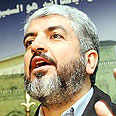
Hamas leader Khaled Mashaal
צילום: איי פי
My talks with Hamas
Israeli leaders should at least consider Hamas proposals for long-term ceasefire
Now I can reveal this: Several months ago, I participated in a series of meetings in Europe that involved a small group of Israeli and Palestinian public figures and academicians, including senior Hamas supporters.
During our talks, they made it clear to us that as far as they could see, in exchange for Israeli willingness to stop the fighting and open the Gaza borders, Hamas will guarantee that quiet will prevail for a period of time to be determined by both sides. They expressed their willingness to talk about a long period of time – 20 or 25 years.
The Hamas supporters did not hide their motives: At this time their organization is hurt and fighting with clenched teeth. It is interested in utilizing the armistice in order to rearm and rebuild its power, in the hopes that in another generation or two it would be able to attack more effectively.
In my view, there was something refreshing in their honesty. Those were people who were not resorting to hypocrisy or two-facedness. They openly expressed their hope for Israel’s elimination, but also said that nobody can tell what the future holds. It is possible that in 10 or 20 years their views would also change, and perhaps their sons and our own sons would view co-existence in a different light.
The Israeli officials we presented these messages to rejected us with contempt. Hamas intends to lull us, rearm and build its power, and ultimately attack again, they claimed. True, we responded, their own representatives admit this, but it won’t hurt to continue looking into the proposal, and perhaps put limits to their ability to rearm.
Moreover, we wondered, what could Hamas do in order to fight the IDF? Would it be able to smuggle jets, helicopters, or tanks through underground tunnels and into the Strip? And if they do, so what? Any rookie military strategist will realize that Hamas’ military build up is bad for it. The more it shifts from being a light-footed and mobile guerilla group to a heavily armed and awkward military, the more it becomes exposed to intelligence gathering efforts and to attack. So please, let them arm themselves, let them establish an orderly military with headquarters and communication means. Let them acquire sophisticated weapons, tanks, and armored personnel carriers. This is a blatant case where power is weakness and weakness is power.
Large-scale operation won’t resolve problem
As 19th century Prussian military strategist Carl von Clausewitz taught us, war is a continuation of policy by other mean. The opposite statement is no less accurate – policy is a continuation of war by other means. It would be good to repeatedly remind ourselves of this simple truth. We have become accustomed to thinking that fighting is not one phase in a sequence of events, but rather, its end.Therefore we are all waiting for the large-scale Gaza operation that would finally resolve the rocket problem. Yet the operation will not be solving the problem. At most it will grant us a break of several months. A call for a military operation could serve short-term political needs, yet statesmen are supposed to think differently.
Gaza is home to a regime that, despite its violent takeover of the Strip, represents many of its residents and is also supported by many in the West Bank. Hamas’ Gaza rulers are indeed different than West Bank rules and are uninterested in a historical compromise with Israel, but they are interested in shifting the conflict from the battlefield to the diplomatic field and are making logical proposals. We should listen to them.
Prof. Dror Ze’evi is a lecturer at Ben-Gurion University’s Middle Eastern Studies Department










